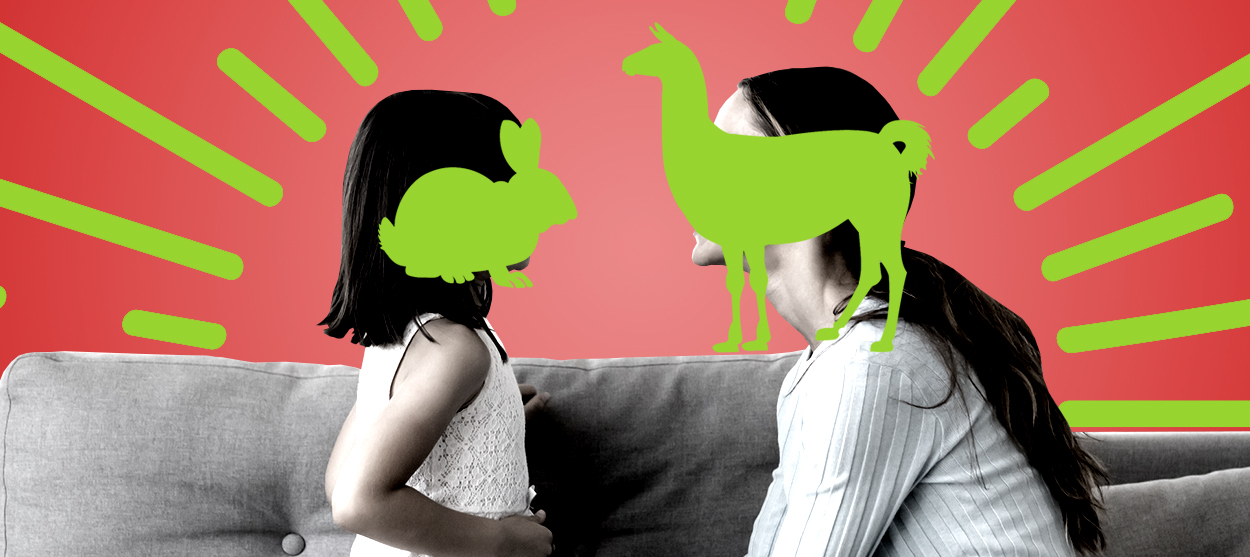You don't need a parenting spirit animal
Forget Tiger Mom. Let's celebrate the hybrid parent instead.


A free daily email with the biggest news stories of the day – and the best features from TheWeek.com
You are now subscribed
Your newsletter sign-up was successful
The 2010s was the decade that saw parents around the world align themselves with a variety of wild, weird, and wonderful animals. It started with the Tiger Mom, introduced to the world in 2011 by Amy Chua's Battle Hymn of the Tiger Mother. This paved the way for the Dolphin Mom and the Jellyfish Mom (both coined by Dr. Shimi Kang in her 2014 book The Dolphin Way: A Parent's Guide to Raising Healthy, Happy, and Motivated Kids Without Turning Into a Tiger). But it was far from a three-way race. The parenting playing field was open to all species. Step forward the Elephant Mom, the Sloth Mom, and the Elk Mom. No doubt, there are a dozen more we haven't met yet.
But while parents were taking online quizzes to determine their parenting spirit animal, they were forgetting one crucial thing. Some kids dig tigers, while others feel far more comfortable hanging out in the sloth enclosure at the zoo. For parents with multiple kids, this can present a challenge.
"Parents often find that one child responds well to their style of parenting, while the other does not," says licensed mental health counselor GinaMarie Guarino. "Adapting your parenting styles to meet the needs of each kid can be a great skill."
The Week
Escape your echo chamber. Get the facts behind the news, plus analysis from multiple perspectives.

Sign up for The Week's Free Newsletters
From our morning news briefing to a weekly Good News Newsletter, get the best of The Week delivered directly to your inbox.
From our morning news briefing to a weekly Good News Newsletter, get the best of The Week delivered directly to your inbox.
As an example, Guarino describes a hypothetical family where one child adjusts well to most situations and has a thick skin, for the most part. Their sibling, however, is shy and sensitive, and finds it more challenging to assert themselves and make friends. In this situation, she recommends taking a more gentle, guiding approach with the more sensitive child, and reserving an assertive, authoritative tone for the more outgoing child.
If you think parenting is challenging enough without having to be a different person/animal for each of your kids, give yourself a break. Being a hybrid parent is about being true to yourself and the needs of your family, rather than trying to force yourself into a mold.
"There's only one you — and you have enough on your plate without worrying too much about trying to have the 'perfect' style for each child," says Jill Whitney, a licensed marriage and family therapist and parenting coach who blogs about relationships and sexuality at Keep The Talk Going. She recommends think of adapting your parenting style as tweaking what's naturally you, rather than trying to be something you're not.
For instance, if you have one child who's up for anything and another who tends to hold back, you'd handle them somewhat differently, while enforcing the same family rules. "With the first child, you might encourage them to slow down and think about consequences, and you might encourage the other one to take some risks," Whitney says. "An always-on-the-go kid might need to have scheduled downtime to read or nap — both to help them rest, and to give you a break — while a less active child might need structure around getting physical activity."
A free daily email with the biggest news stories of the day – and the best features from TheWeek.com
Whitney points out all sorts of other variations that might prompt you to modify your parenting style: a child who thrives on more physical affection or focused attention than their siblings; a strong-willed child who needs more guidance about using their voice constructively; an easily distracted kid who needs more reminders to stay on task; a sensitive child who doesn't roll with a parent's jokey or rough-and-tumble style.
"There's nothing wrong with any of this, but you'll be more effective if you adapt somewhat to fit," Whitney says. She compares it to being in a work environment: "Each person on a team is different, and a wise boss lets each employee just do what they're good at, while guiding or setting limits in areas where more support is needed."
And you only have to make small adjustments to notice the benefits, says licensed clinical social worker Karen Chambre. When you start to identify your kids' different needs and adapt your parenting style accordingly, your kids will flourish, she says.
"All humans need to be exclusively seen, heard, and understood," Chambre adds. "Responding to each child's individual needs can make them feel that they are loved for who they are, rather than who their parents want them to be." The positive consequences are far-reaching, she says: They're more likely to form secure attachments, feel grounded, and develop a genuinely robust sense of themselves.
Central to the idea that you can adapt your parenting style to suit whatever child you're focused on at that particular moment is bringing it back to yourself, Chambre says. Pay attention to how each child might trigger difficult emotions, like anger or frustration. When you can understand why — rather than simply judging or reacting — you can reach a place where your parenting style becomes more intuitive. In others words, you won't have to stop and think about how to parent a particular child, because it will come naturally.
Like every aspect of parenting, it's crucial to keep things in perspective and remember that every kid — just like their parents — is a complex human. "Don't let worries about adapting your parenting style get in the way of trusting your gut," Whitney says. "You know your kids; you have a good read on what they need. Pay attention to their unique needs, but don't lose sight of your own need to be who you are."
Want more essential commentary and analysis like this delivered straight to your inbox? Sign up for The Week's "Today's best articles" newsletter here.
Claire Gillespie is a freelance writer with bylines on Health, SELF, Refinery29, Glamour, The Washington Post, and many more. She likes to write about parenting, health, and culture. She lives in Scotland with her husband and six kids, where she uses every (rare) spare moment to work on her novel.
-
 Political cartoons for February 14
Political cartoons for February 14Cartoons Saturday's political cartoons include a Valentine's grift, Hillary on the hook, and more
-
 Tourangelle-style pork with prunes recipe
Tourangelle-style pork with prunes recipeThe Week Recommends This traditional, rustic dish is a French classic
-
 The Epstein files: glimpses of a deeply disturbing world
The Epstein files: glimpses of a deeply disturbing worldIn the Spotlight Trove of released documents paint a picture of depravity and privilege in which men hold the cards, and women are powerless or peripheral
